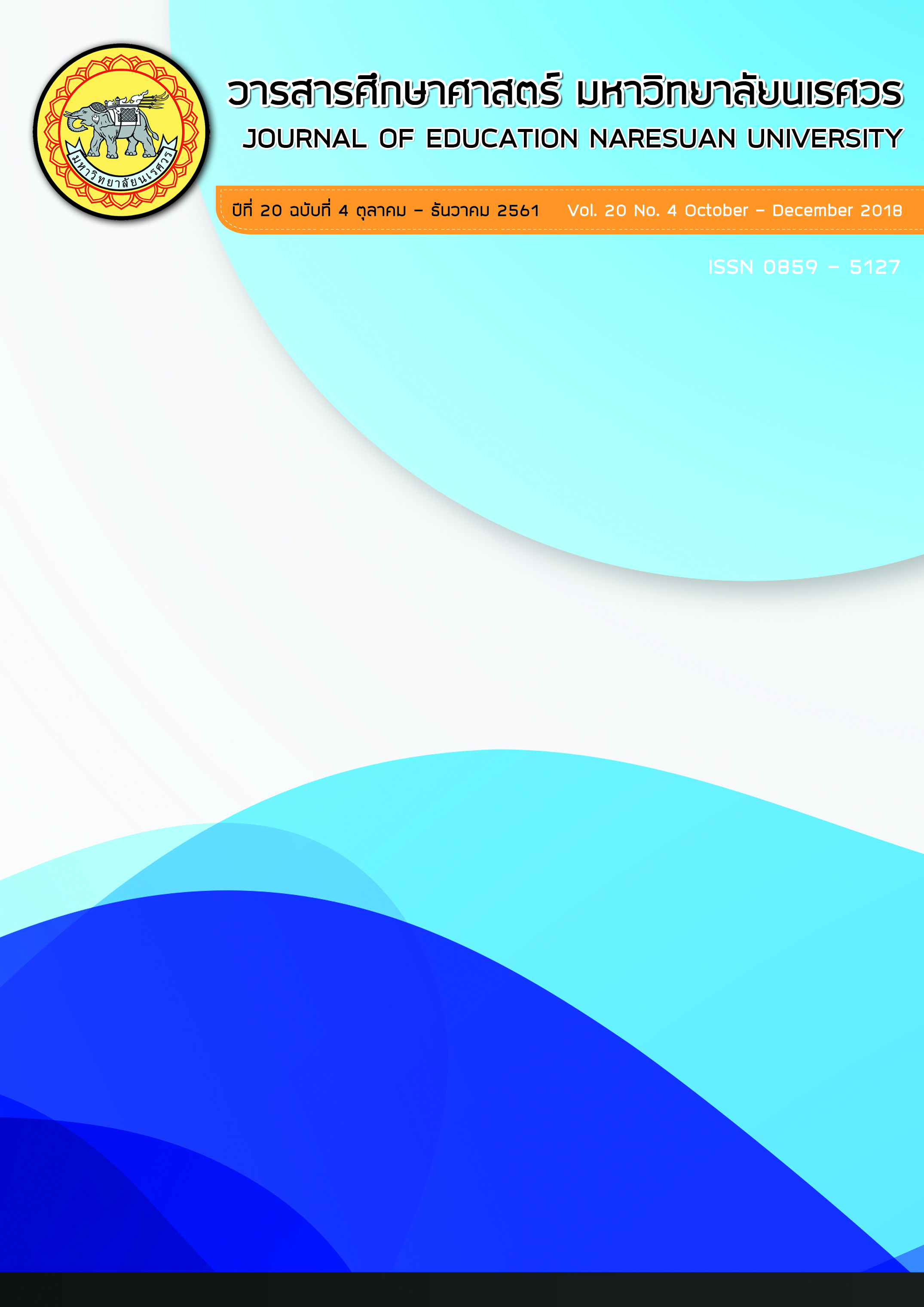หันมองการผลิตและพัฒนาครูของประเทศไทยผ่านเลนส์ของนักครุศึกษา; LOOKING AT TEACHER EDUCATION AND PROFESSIONAL DEVELOPMENT IN THAILAND THROUGH THE LENS OF A TEACHER EDUCATOR
Main Article Content
Abstract
การผลิตและพัฒนาครูเป็นหัวใจสำคัญของการปฏิรูปการศึกษา บทความนี้มีจุดประสงค์เพื่อนำเสนอแนวคิดการผลิตครูและพัฒนาครูของประเทศไทยโดยผ่านมุมมองของนักครุศึกษา จากมุมมองดังกล่าวทำให้เห็นว่าการผลิตและพัฒนาครูควรเริ่มจากการตั้งเป้าหมายคุณลักษณะพลเมืองของประเทศเพื่อชี้นำไปสู่คุณลักษณะและสมรรถนะของครู กระบวนการผลิตและพัฒนาครูควรปรับวิธีการรับและกระบวนการผลิต โดยเน้นการรับคนเก่งและมีจิตวิญญาณความเป็นครูเข้ามาเป็นครู และเน้นให้นิสิตได้ลงมือปฏิบัติเพื่อเชื่อมโยงกับทฤษฎี รวมทั้งการเน้นการสะท้อนความคิดจากการปฏิบัติ และพัฒนาครูควรพัฒนาครูใหม่เพื่อให้เกิดความต่อเนื่องระหว่างการผลิตครูและครูประจำการ
LOOKING AT TEACHER EDUCATION AND PROFESSIONAL DEVELOPMENT IN THAILAND THROUGH THE LENS OF A TEACHER EDUCATOR
Teacher education and professional development plays a crucial role in educational reform in Thailand. This article aims at giving recommendations on teacher education and professional development in Thailand though the lens of teacher education. Teacher education should start with considering anticipated attributes of Thai citizens then think about teacher attributes and competency. Recruitment for teacher candidates and teacher education programs should be reconsidered. The candidates who have high competency and strong teacher spirit should be selected. Teacher education program should be practice-based and reflection-based activities in order to help pre-service teacher link theories and practice. Induction program are also recommended for teacher education in Thailand. This program will link and fill the gap between pre-service and in-service teacher education.
Article Details
The owner of the article does not copy or violate any of its copyright. If any copyright infringement occurs or prosecution, in any case, the Editorial Board is not involved in all the rights to the owner of the article to be performed.
References
Bell, B., & Gilbert, J. (1994). Teacher development as professional, personal, and social development. Teaching and Teacher Education, 10(5), 483-497.
Berliner, D. (2006). ‘Our impoverished view of educational reform’. The Teachers College Record, 108(6), 949-95.
Berry, A., Loughran, J., & van Driel., J.H. (2008). Revisiting the roots of Pedagogical Content Knowledge. International Journal of Science Education, 30(10), 1271-1280.
Bradbury, L.U., Wilson, R.E., & Brookshire, L.E. (2017). Developing elementary science PCK for teacher education: Lesson learned from a secondary grade partnership. Research in Science Education. (Online First) DOI 10.1007/s11165-016-9607-x
Chan. K.K., & Yung, B.H. 2015. On-site pedagogical content knowledge development. International Journal of Science Education, 37(8), 1246-1278.
Cochran-Smith, M. (2006). Policy, practice, and politics in teacher education: Editorials from the Journal of Teacher Education. Thousand Oaks, CA: Corwin Press.
Cochran-Smith, M. & Lytle, S. (1993). Inside-Outside: Teacher Research and Knowledge. New York: Teachers College Press.
Darling-Hammond, L., Burns, D., Cambell, C., Goodwin, L., Hammerness, K., Low, E., McIntyre, A., Sato, M., & Zeichner, K. (2017). Empowered educators: How high-performing systems shape teaching quality around the world. CA, United States: Jossey-Bass.
Ellis, V. & McNicholl, J. (2015). Transforming teacher education: reconfiguring the academic work: London: Bloomsbury Publishing.
Faikhamta, C. (2013). Self-study research: An alternative professional development strategy for teacher educators. Journal of Education Naresuan University, 15(1), 100-110. (in Thai)
Hollin, E.R. (2015). Rethinking Field Experiences in Preservice Teacher Preparation: Meeting New Challenges for Accountability. New York: Routledge.
Institutes for the Promotion of Teaching Science and Technology (IPST) & OECD. (2017). PISA 2015 results in focus: Executive summary. Bangkok: IPST.
Kagan. D.M. (1992). Professional growth among preservice and beginning teachers. Review of Educational Research, 62(2), 129-169.
Loughran, J. (2007). Researching teacher education practices: responding to the challenges, demands, and expectations of self-study. Journal of Teacher Education, 58(1), 12-20.
McNiff, J., Lomax, P., & Whitehead, J. (2003). You and Your Action Research Project. London, Routledge.
Niemi, H, Toom, A, Kallioniemi, A (eds.). (2012). Miracle of Education: The Principles and Practices of Teaching and Learning in Finnish Schools, Sense Publishers, Rotterdam.
Schön, D.A. (1983). The Reflective Practitioner: How Professionals Think in Action. New York: Basic Books.
Shulman, L. S. (1986). Those who understand: Knowledge growth in teaching. Educational Researcher, 15(2), 4-14.
Sperandeo-Mineo, R. M., Fazio, C. & Tarantino, G. (2005). Pedagogical content knowledge development and pre-service physics teacher education: A case study. Research in Science Education, 36(3), 235-268.
Tan, O. S., Liu, W. C., & Low, E. L. (2012). Educational reforms and teacher education innovations in Singapore. In O. S. Tan (Ed.), Teacher education frontiers: International perspectives on policy and practice for building new teacher competencies (pp. 71 - 91). Singapore: Cengage Learning Asia Pte.
Zeichner, K. (2003). Teacher research as professional development for p-12 educators in the U.S. Educational Action Research, 11(2), 301-325.
Zeichner, K. (2010). Rethinking the connections between campus courses and field experiences in college and university-based teacher education programs. Journal of Teacher Education, 89(11), 89-99.

